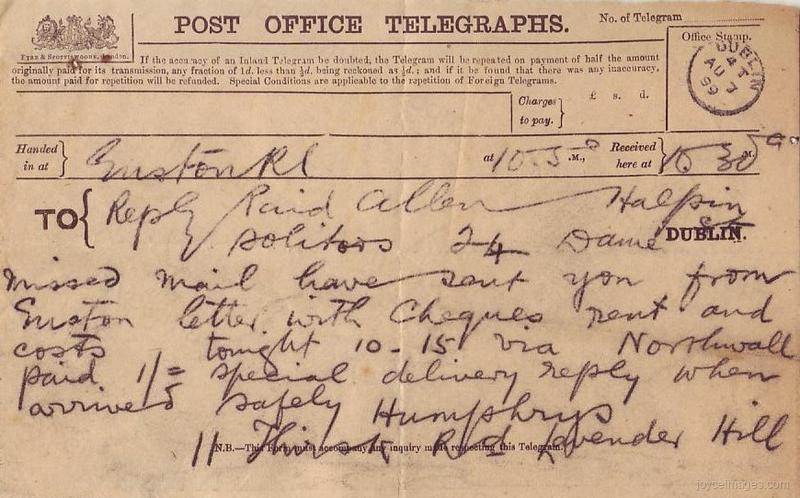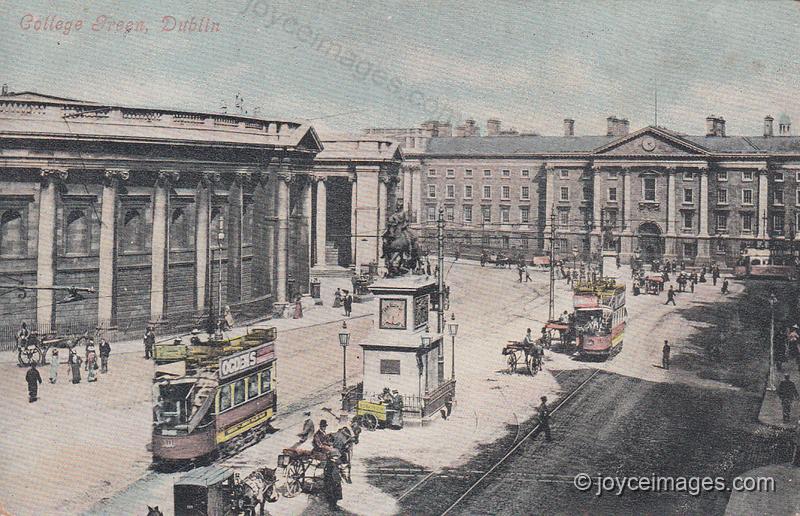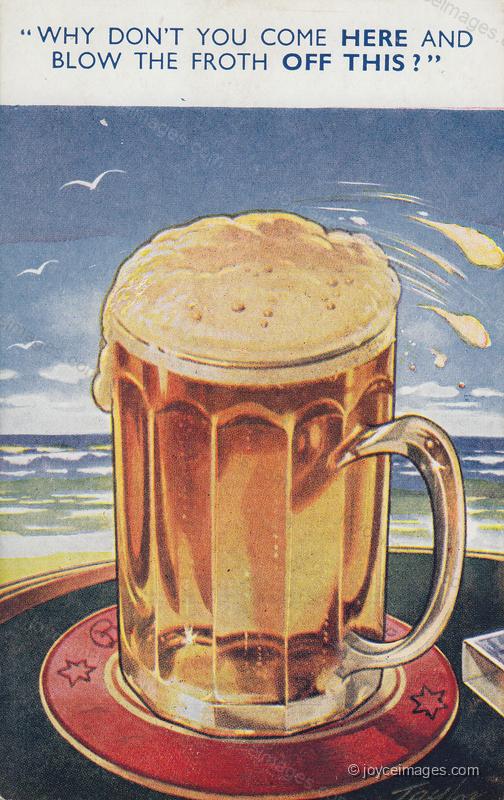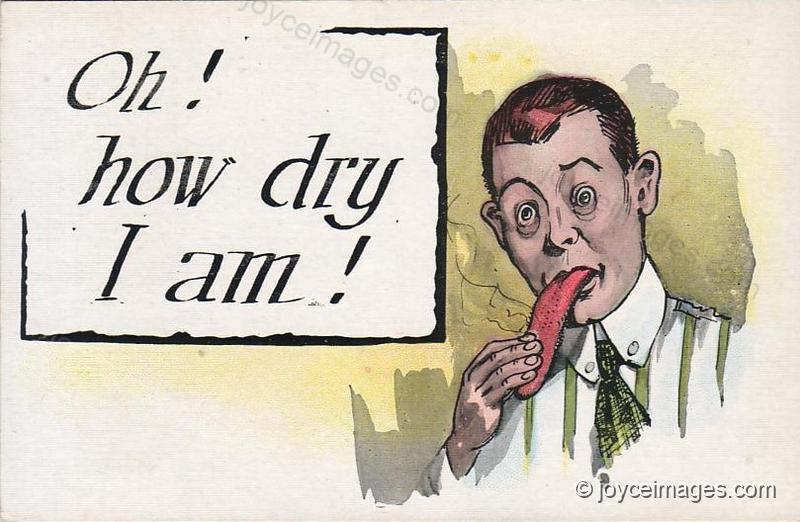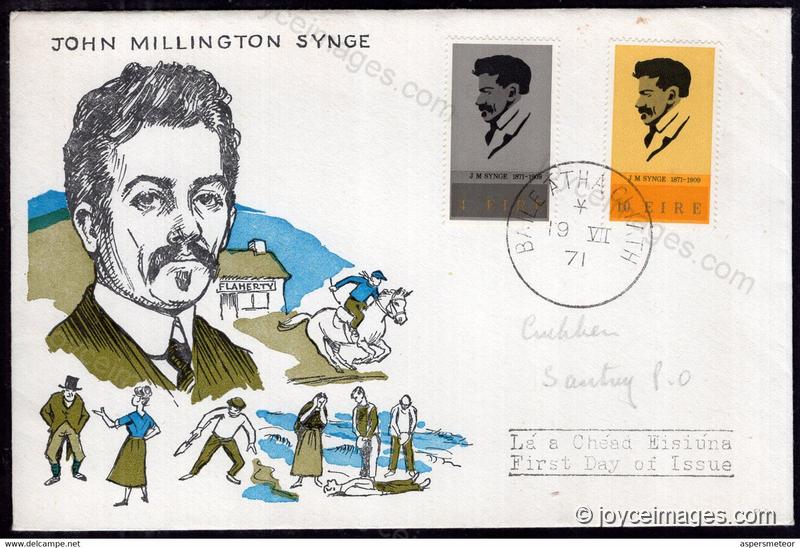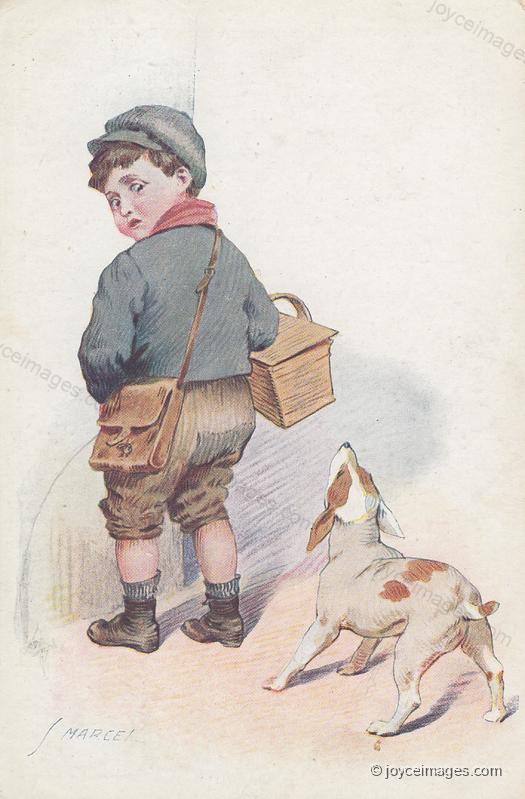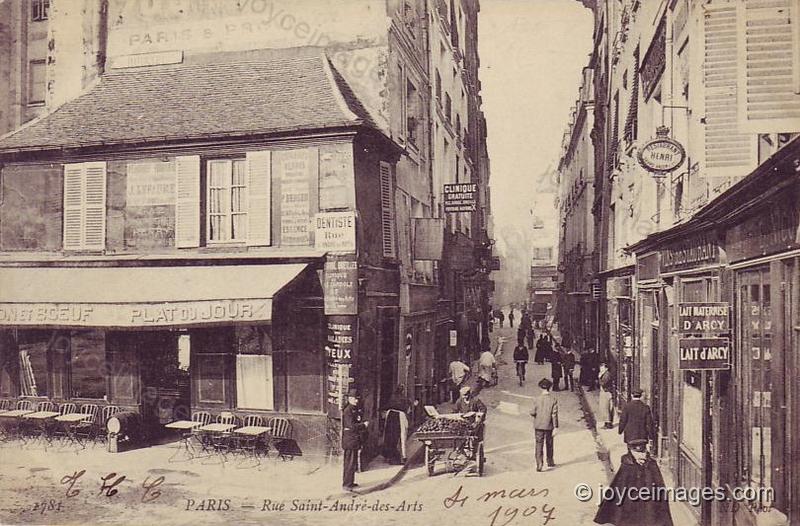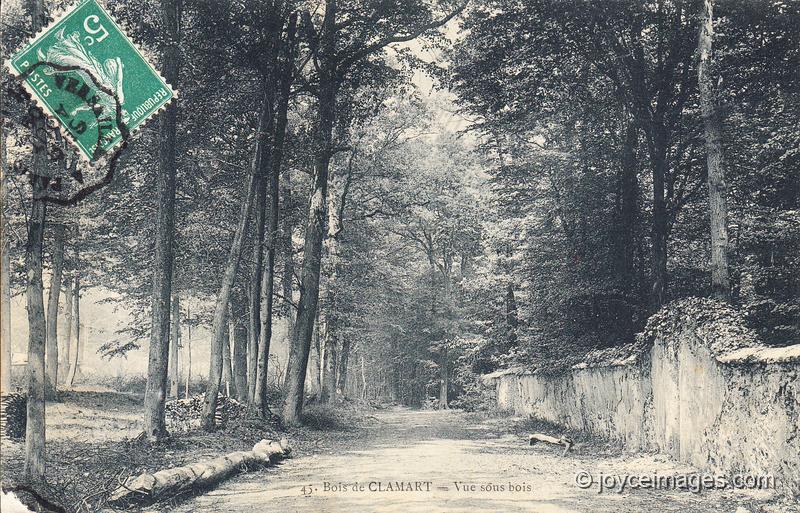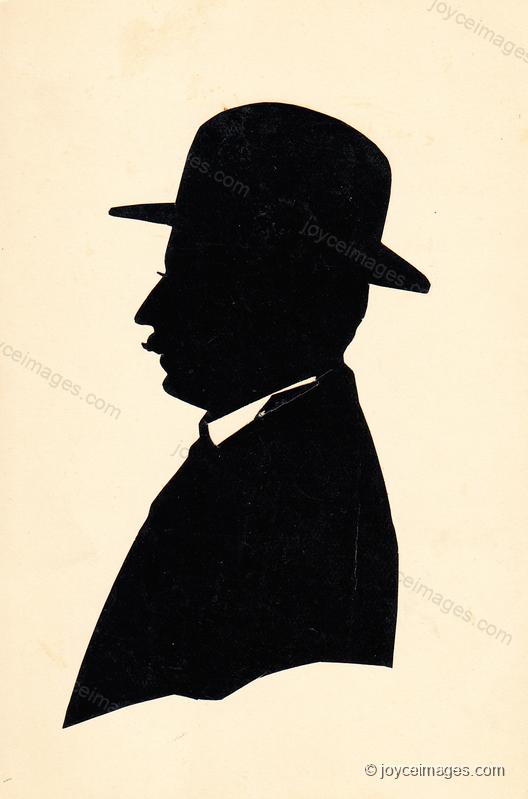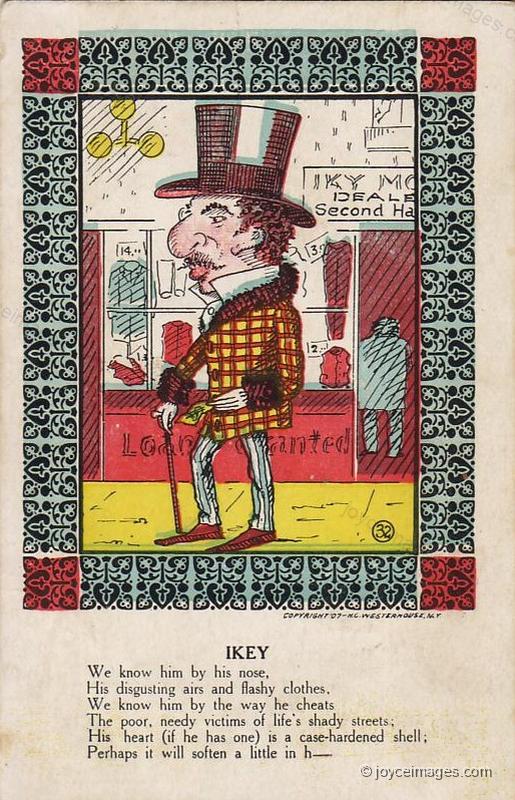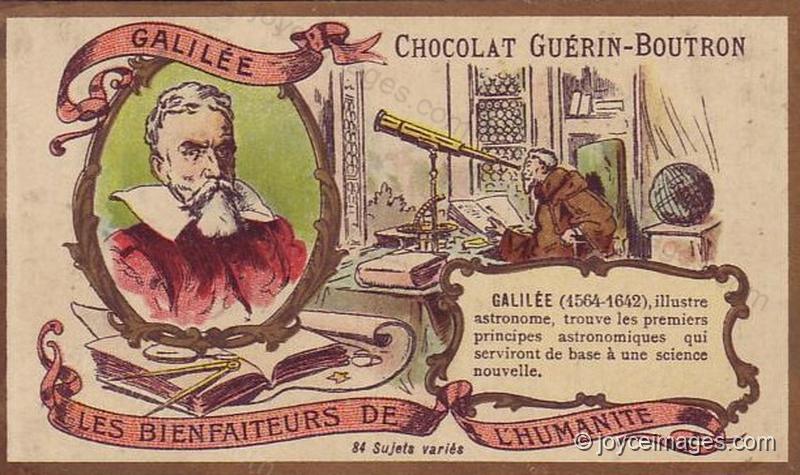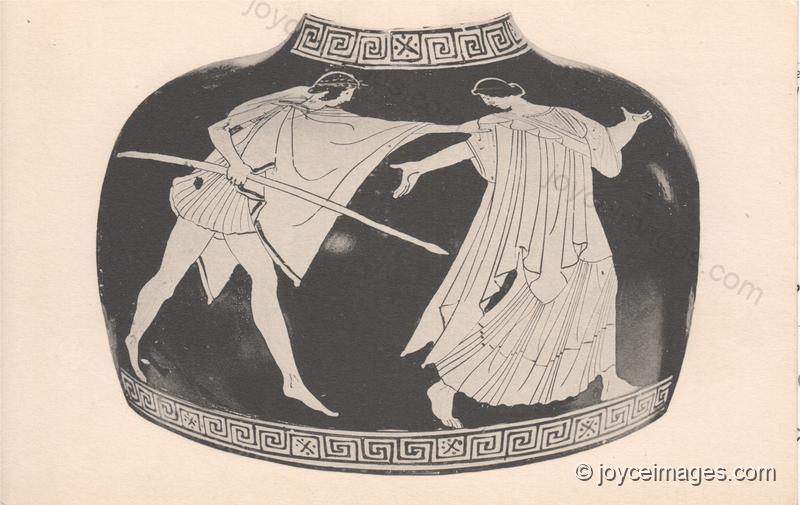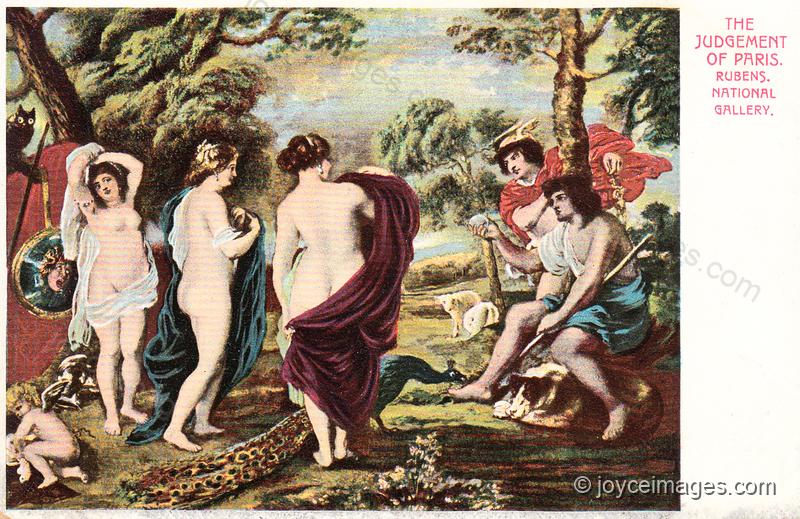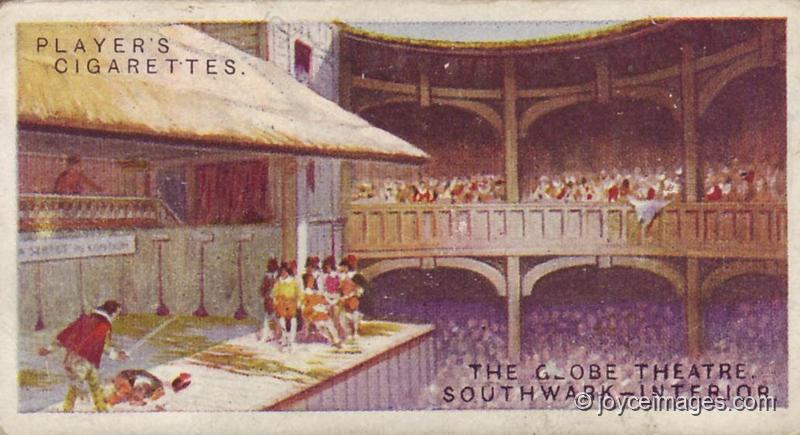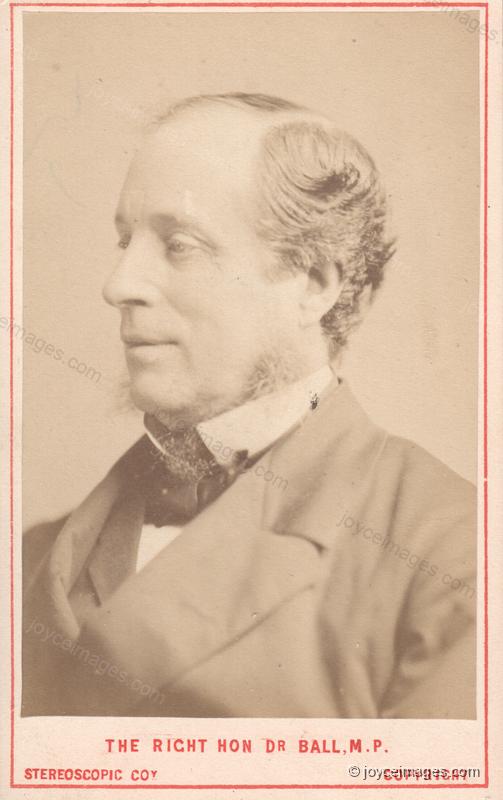"Buck Mulligan's again heavy face eyed Stephen awhile. Then, his head wagging, he came near, drew a folded telegram from his pocket. His mobile lips read, smiling with new delight.
- Telegram! he said. Wonderful inspiration! Telegram! A papal bull!
He sat on a corner of the unlit desk, reading aloud joyfully:
— The sentimentalist is he who would enjoy without incurring the immense debtorship for a thing done. Signed: Dedalus." (U9.545)
- Telegram! he said. Wonderful inspiration! Telegram! A papal bull!
He sat on a corner of the unlit desk, reading aloud joyfully:
— The sentimentalist is he who would enjoy without incurring the immense debtorship for a thing done. Signed: Dedalus." (U9.545)
" Where did you launch it from? The kips? No. College Green. Have you drunk the four quid? The aunt is going to call on your unsubstantial father. Telegram! Malachi Mulligan, The Ship, lower Abbey street. O, you peerless mummer! O, you priestified Kinchite!
Joyfully he thrust message and envelope into a pocket but keened in a querulous brogue:
— It's what I'm telling you, mister honey, it's queer and sick we were, Haines and myself, the time himself brought it in." (U9.551)
Joyfully he thrust message and envelope into a pocket but keened in a querulous brogue:
— It's what I'm telling you, mister honey, it's queer and sick we were, Haines and myself, the time himself brought it in." (U9.551)
"'Twas murmur we did for a gallus potion would rouse a friar, I'm thinking, and he limp with leching. And we one hour and two hours and three hours in Connery's sitting civil waiting for pints apiece" (U9.559)
"He wailed:
- And we to be there, mavrone, and you to be unbeknownst sending us your conglomerations the way we to have our tongues out a yard long like the drouthy clerics do be fainting for a pussful.
Stephen laughed.
Quickly, warningfully Buck Mulligan bent down:" (U9.563)
- And we to be there, mavrone, and you to be unbeknownst sending us your conglomerations the way we to have our tongues out a yard long like the drouthy clerics do be fainting for a pussful.
Stephen laughed.
Quickly, warningfully Buck Mulligan bent down:" (U9.563)
"He heard you pissed on his halldoor in Glasthule. He's out in pampooties to murder you.
— Me! Stephen exclaimed. That was your contribution to literature.
Buck Mulligan gleefully bent back, laughing to the dark eavesdropping ceiling.
— Murder you! he laughed." (U9.569)
— Me! Stephen exclaimed. That was your contribution to literature.
Buck Mulligan gleefully bent back, laughing to the dark eavesdropping ceiling.
— Murder you! he laughed." (U9.569)
"Harsh gargoyle face that warred against me over our mess of hash of lights in rue Saint-André-des-Arts. In words of words for words, palabras. Oisin with Patrick." (U9.576)
"Faunman he met in Clamart woods, brandishing a winebottle. C'est vendredi saint! Murthering Irish. His image, wandering, he met. I mine. I met a fool i' the forest." (U9.578)
"— Mr Lyster, an attendant said from the door ajar.
— .....in which everyone can find his own. So Mr Justice Madden in his Diary of Master William Silence has found the hunting terms.... Yes? What is it?
— There's a gentleman here, sir, the attendant said, coming forward and offering a card. From the Freeman. He wants to see the files of the Kilkenny People for last year.
— Certainly, certainly, certainly. Is the gentleman......?
He took the eager card, glanced, not saw, laid down unglanced, looked, asked, creaked, asked:
— Is he......? O, there!
Brisk in a galliard he was off, out. In the daylit corridor he talked with voluble pains of zeal, in duty bound, most fair, most kind, most honest broadbrim.
— This gentleman? Freeman's Journal? Kilkenny People? To be sure. Good day, sir. Kilkenny.... We have certainly....
A patient silhouette waited, listening.
— All the leading provincial.... Northern Whig, Cork Examiner, Enniscorthy Guardian. Last year. 1903..... Will you please... Evans, conduct this gentleman... If you just follow the atten.... Or, please allow me.... This way... Please, sir...." (U9.581)
— .....in which everyone can find his own. So Mr Justice Madden in his Diary of Master William Silence has found the hunting terms.... Yes? What is it?
— There's a gentleman here, sir, the attendant said, coming forward and offering a card. From the Freeman. He wants to see the files of the Kilkenny People for last year.
— Certainly, certainly, certainly. Is the gentleman......?
He took the eager card, glanced, not saw, laid down unglanced, looked, asked, creaked, asked:
— Is he......? O, there!
Brisk in a galliard he was off, out. In the daylit corridor he talked with voluble pains of zeal, in duty bound, most fair, most kind, most honest broadbrim.
— This gentleman? Freeman's Journal? Kilkenny People? To be sure. Good day, sir. Kilkenny.... We have certainly....
A patient silhouette waited, listening.
— All the leading provincial.... Northern Whig, Cork Examiner, Enniscorthy Guardian. Last year. 1903..... Will you please... Evans, conduct this gentleman... If you just follow the atten.... Or, please allow me.... This way... Please, sir...." (U9.581)
"Voluble, dutiful, he led the way to all the provincial papers, a bowing dark figure following his hasty heels.
The door closed.
- The sheeny! Buck Mulligan cried.
He jumped up and snatched the card.
- What's his name? Ikey Moses? Bloom.
He rattled on:
- Jehovah, collector of prepuces, is no more. I found him over in the museum when I went to hail the foamborn Aphrodite. The Greek mouth that has never been twisted in prayer. Every day we must do homage to her. Life of life, thy lips enkindle." (U9.602)
The door closed.
- The sheeny! Buck Mulligan cried.
He jumped up and snatched the card.
- What's his name? Ikey Moses? Bloom.
He rattled on:
- Jehovah, collector of prepuces, is no more. I found him over in the museum when I went to hail the foamborn Aphrodite. The Greek mouth that has never been twisted in prayer. Every day we must do homage to her. Life of life, thy lips enkindle." (U9.602)
"Suddenly he turned to Stephen:
- He knows you. He knows your old fellow. O, I fear me, he is Greeker than the Greeks." (U9.613)
- He knows you. He knows your old fellow. O, I fear me, he is Greeker than the Greeks." (U9.613)
"His pale Galilean eyes were upon her mesial groove. Venus Kallipyge. O, the thunder of those loins!" (U9.615)
"The god pursuing the maiden hid.
— We want to hear more, John Eglinton decided with Mr Best's approval. We begin to be interested in Mrs S. Till now we had thought of her, if at all, as a patient Griselda, a Penelope stay-at-home." (U9.616)
— We want to hear more, John Eglinton decided with Mr Best's approval. We begin to be interested in Mrs S. Till now we had thought of her, if at all, as a patient Griselda, a Penelope stay-at-home." (U9.616)
"— Antisthenes, pupil of Gorgias, Stephen said, took the palm of beauty from Kyrios Menelaus' brooddam, Argive Helen, the wooden mare of Troy in whom a score of heroes slept, and handed it to poor Penelope." (U9.621)
"he drew a salary equal to that of the lord chancellor of Ireland. His life was rich." (U9.624)
Lord Chancellor was the highest judicial office in Ireland. The Lord Chancellor was also Speaker of the Irish House of Lords, and Lord Keeper of the Great Seal of Ireland. This CDV shows the Rt Hon. John Thomas Ball MP (1815 - 1898), an Irish barrister, judge, politician, and Lord Chancellor of Ireland 1875 - 1880. The position was abolished with the Free State in 1922.
Lord Chancellor was the highest judicial office in Ireland. The Lord Chancellor was also Speaker of the Irish House of Lords, and Lord Keeper of the Great Seal of Ireland. This CDV shows the Rt Hon. John Thomas Ball MP (1815 - 1898), an Irish barrister, judge, politician, and Lord Chancellor of Ireland 1875 - 1880. The position was abolished with the Free State in 1922.
